Martin Edwards's Blog, page 36
October 6, 2023
Forgotten Book - The Long Shadow
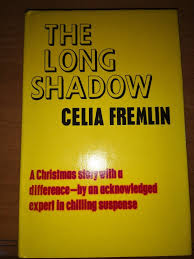
Celia Fremlin's crime writing career began brilliantly, with an Edgar-winning debut, maintained a high level for a considerable stretch, and then rather faded out. To some extent, the same can be said of her novel The Long Shadow, which dates from 1975. As ever with Fremlin, it's very readable, but my main reservation was that the resolution of the story wasn't up to the standard of the beginning.
And that beginning really is good. We're introduced to Imogen Barnicott, the third wife of a leading academic who has recently died. He was widely admired, and many people console Imogen. But a number of witty lines - 'How Ivor would have loved being dead!' - suggest that all is not quite as it seems, and the first chapter ends with her murmuring to herself: 'Please God, don't let me ever forget what a bastard he could be.'
My first doubts about the story emerged when a man she meets claims that she killed Ivor. This is absolutely untrue, but when the man tries to blackmail her, her response is passive rather than active and this bothered me. She simply dismisses him as 'a nut'. No matter, the story continues to be entertaining. But Imogen's passivity did begin to grate when she allows a variety of people - including one of Ivor's other exes - to come to stay with her indefinitely.
The later stages of the book also left me somewhat dissatisfied, mainly because of the part played in events by two people who have not emerged very clearly in the preceding narrative. I suspect that Fremlin came up with an intriguing character-based situation (she experienced widowhood herself) but struggled to develop the plot. As a result, this is a book that offers plenty of pleasures, but is not quite up to her highest standard.
Forgotten Book - Fatal Venture
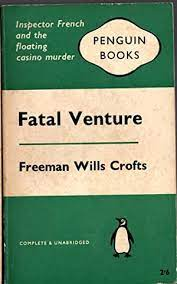
If I'd read Fatal Venture as a teenager, I wouldn't have been impressed. I tried Freeman Wills Crofts at the age of thirteen or fourteen and found the books a struggle. I gave up at least one of them long before the end. There simply wasn't enough pace and excitement for me. And this novel certainly moves at a stately pace. Yet, a lot older and a bit wiser these days, I appreciated its merits when I read it a while back.
The story was published in 1939, but you'd never guess that war was looming. There is brief mention of a foreign envoy, but no hint of international tensions. On the contrary, the government's chief preoccupation seems to be its moral panic over a floating casino which offers cruises around the British Isles, just outside the three mile limit. A good deal of space is devoted to the plans to set up the casino business, and this is relevant to the plot, but people less interested in business life than me might find reading this part of the story a bit of a chore. Murder isn't done until we're almost half-way through the book.
In reading this novel, I was interested to try to figure out how Crofts wrote it. The central plot twist involves a pretty simple idea that he might easily have used in a short story. As you might guess, it concerns an alibi. It's clear that he took a dim view of gambling and this issue adds texture to the story, though he never gets under the skin of the gambler's obsession or indeed of the terrible consequences of gambling addiction. Crofts loved to travel, and the extensive travelogue aspects of the story, although again relevant, aren't conducive to pace. But I must admit that they reminded me that I'd like to go on a cruise of the British Isles - I gather that they have become increasingly popular, post-pandemic, though gambling isn't a component of the offer to tourists.
Crofts added depth and interest to the story with a structural device that enabled him to weld his components into a single entity and make a full-length novel out of them. The book is composed of two parts: pre- and post- police investigation. We see the establishment of the floating casino business through the eyes of Morrison, a young man who becomes closely involved. Morrison is quite likeable, but his occasional stupidity, although necessary to make the story work, is slightly irritating. Then - even though the crime is not committed in England - Inspector French comes on to the scene, and we know that eventually he'll get his man - or woman. There's even a bit of 'had-I-but-known' stuff to encourage readers to keep going: 'Though neither of them knew it, their tentative arrangement was to prove the most momentous either had ever made', for example. I think some readers will find this a minor work, and rather slow-moving, but I enjoyed it.
October 4, 2023
Return to Sender - 2015 film review
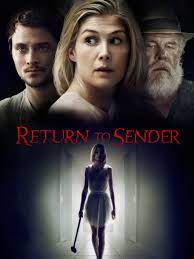
Return to Sender stars Rosamund Pike in a part she played shortly before earning global stardom as a result of Gone Girl. This film is also a psychological thriller, but the script is definitely not in the Gone Girl league, although Mark Kermode described it as 'an assured revenge thriller'. One of the undoubted strengths of the film is a cast which includes not only Nick Nolte (as Pike's ageing father) but also the likes of Illeana Douglas in a minor role as an estate agent with strange ideas about how to sell a house.
The story begins slowly and I felt that the tension was built quite well, if in rather painstaking fashion. Rosamund Pike is Miranda Wells, a nurse with ambitions to become involved with surgical work. She's a rather chilly character, a loner with a fear of dirt who has a close relationship with her father, but detests his dog. Her work colleagues set her up with a blind date. But then things go horribly wrong.
At one point I was unsure where the story was going, and this degree of uncertainty was quite pleasing. Unfortunately, plot holes began to emerge and several things happened which I found difficult to believe. Even allowing for the fact that the criminal justice system in the US is different from that in Britain, some of what happened was highly implausible.
Alas, the story degenerates in the later stages. It becomes easy to predict what is going to happen - and sure enough, it does. So I ended up with a sense of disappointment, lessened only by the interest of seeing a couple of very accomplished actors, doing their best with the material to hand. This isn't as bad a movie as some reviews suggest, in my opinion, but my guess is that if the same script were sent to Rosamund Pike today, she'd be pretty quick to return it to sender.
October 3, 2023
Francis Lee R.I.P.

I was sorry to learn yesterday of the death of Francis Lee, the former Manchester City and England footballer. He was a schoolboy hero of mine, and I simply can't let his passing go unmentioned, even though he has no connection to crime fiction that I know of. He was, however, responsible for one immortal quote that gave rise to a book title, saying (in the dark days when City were a team of perennial under-achievers), 'If there were cups for cock-ups, City's trophy cabinet would be overflowing'. Many a true word...
Francis Lee - or Franny as he was usually known - was an extremely combative striker with a ferocious shot. I had his photo on a school exercise book and on the wall of my student room. Although I didn't watch live top level football regularly, I was lucky enough to witness some of his greatest performances. He scored a hat-trick at Old Trafford on a memorable Saturday when City thrashed Manchester United, George Best and all. And he was in the team that I watched win the 1969 FA Cup Final at Wembley. He also scored about the most ferocious goal I've ever seen, in a Cup game one winter's evening at City's old Maine Road ground. He lashed the ball from about thirty yards out and it went so fast that I don't think anyone saw it before it hit the back of the net.
He was famous as one of the finest penalty takers football has known. His record of scoring 15 penalties in an English top-tier league season still stands. He often earned the penalties himself with dramatic tumbles, earning the nickname Lee Won Pen. A great competitor, whom City and England let go far too soon.
In later years he became a rich businessman and had a spell as City chairman, but by then the dark days were entrenched and he enjoyed no success at the helm. But he lived long enough to see Manchester City become - most unbiased people would surely agree - the world's finest club team in 2023. He gave me plenty of happy memories and for that I'm very grateful.
October 2, 2023
The Raging Storm by Ann Cleeves - review
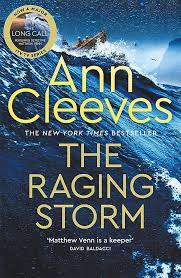
Last week I had the pleasure of interviewing Ann Cleeves for Barnes & Noble. There was a very good audience with lots of questions and thank goodness the technology worked a treat. I was a bit nervous beforehand, but once we got going, everything was fine. The reason for the interview was that Ann's new book, The Raging Storm, has just been published. Not to be confused with her last book, The Rising Tide, this is the third in her North Devon series featuring the gay detective Matthew Venn.
The story begins with a sort of 'prodigal returns' scenario, as the celebrity adventurer Jem Rosco arrives back in Greystone (based on a place called Hartland Quay), where he developed his sailcraft. He says he's waiting for someone, but is irritatingly mysterious about who that someone might be. In the second chapter, Mary Ford and her colleagues are called out to perform a rescue in the local lifeboat (the book is dedicated to the RNLI) but what they discover is Jem's dead body.
Matthew and his team are called in and it soon becomes clear that Jem has been murdered. He wasn't by any means universally popular, and a number of possible murder motives emerge, as do various potential suspects. As ever, the landscape is splendidly evoked and it made me want to go back to Devon again. One slight quirk is that the publishers have included a map of Devon, but this doesn't show the key fictional locations featured in the story, which I found rather odd.
There are some interesting observations in this novel, for instance about social class, and Matthew's religious upbringing again plays a part. Particularly good is the way that Ann examines the nature of celebrity status and charisma. Early on, there's a reference to Dorothy L. Sayers and Golden Age detective fiction and the explanation at the end is one of the most intricate Ann has ever come up with. Early on, Matthew appears to overlook one pretty obvious area of enquiry, and that isn't the only mistake he makes. He's no Lord Peter Wimsey, but dogged perseverance gets him there in the end.
September 29, 2023
Forgotten Book - The Blackbirder
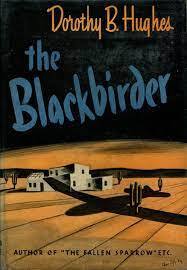
From the slavery era right up to the present day, people trafficking has been an ugly trade, as unscrupulous people have cashed in on the desperation of others. Dorothy B. Hughes' The Blackbirder was published in 1943, but in some respects it has a timeless quality - a 'blackbirder' in this context is a trafficker. The story concerns the trafficking of people desperate to escape from the Nazis, and that background pins the book as a fascinating contribution to social history. But it's much more than that.
We see everything from the point of view of a young woman whose name is Julie (in fact, she has several names during the course of the story, as she strives to escape trouble). Her courage and determination are admirable, although sometimes - and this is done by Hughes with great narrative skill - she misinterprets what she sees, and the motives of people she encounters. The touches of naivete make her all the more appealing.
We first encounter Julie in New York. She is on the run - but from what, from whom? She's clearly worried when she encounters a young acquaintance called Maxl, but she spends some time with him before he leaves her outside the door of her apartment. Unfortunately, he is then murdered, and Julie, fearing that she may be a suspect, and will soon be found out by the authorities, goes on the run.
Hughes builds the tension with subtlety as well as dynamism. I found this a gripping read from start to finish. It's an unusual book, and one that demonstrates a combination of storytelling flair with in-depth human insight. A very good read indeed. I've read a few negative reviews of this one on Goodreads, which just shows that even a great writer can't please everyone. Ignore the negativity and give it a go. I don't think you'll be disappointed.
September 27, 2023
The Foreigner - 2017 film review
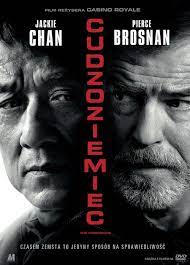
The Foreigner is an entertaining revenge thriller that was released in 2017 to considerable acclaim. The fact that the cast is led by the perhaps unlikely combination of Pierce Brosnan and Jackie Chan makes it interesting, but there's more to the film (script by David Marconi, source material a novel by Stephen Leather) than that. It's fair to say that the acclaim wasn't universal - a review on the usually insightful Roger Ebert website calls it 'an all-round lousy movie', but don't take too much notice of that, since the critical acumen of the reviewer, who is plainly not the late Roger Ebert, can be judged by the fact that he regards Brosnan's Irish accent as 'atrocious'. Oh dear.
Anyway, Chan plays a chap called Quan, who is leading a quiet life in London when his daughter is murdered in a terrorist incident. He determines to find out who is responsible and mete out his own kind of justice. So far, so very straightforward, but the story gains depth from the way in which Quan targets Brosnan's character, Liam Hennessey.
Hennessey, who bears a disconcerting resemblance to a prominent Irish politician in reality, is presented as a dodgy character, in his personal life as well as in his political machinations. He is emphatically not responsible for the attack which killed Quan's daughter, but Quan is right to believe that such an influential figure is bound to know where, to coin a phrase, the bodies are buried.
The political dimensions to the story don't get in the way of the action, which is effectively done, but not over-done. Jackie Chan's age makes him an unlikely action man, but he gives a good performance and the implausibilities of the story are addressed quite well in the script, with the tension maintained to the end. I enjoyed it and so, it should be said, did a large majority of the reviewers.
September 25, 2023
No Way Out - 1987 film review
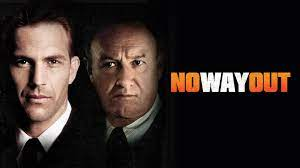
It isn't often that a remake of a successful and well-made film matches the original, far less surpasses it. One of the rare exceptions to this principle, I think, is No Way Out, which was based (very, very, loosely) on Kenneth Fearing's terrific novel The Big Clock, which was superbly filmed in 1948. There has also been a French remake with the improbable title Police Python 357, which I've never seen.
The central idea of The Big Clock is of a man being tasked to find a missing witness to a murder, who is in fact himself. The problem is that he's acutely aware that when the truth comes out, his life will be in extreme danger. This 'manhunt for oneself' idea wasn't original to Fearing, but it's a fascinating one which has been employed by various writers over the years, including Derek Marlowe in A Dandy in Aspic, and there's even an echo of it in a sub-plot in my own Sepulchre Street.
Robert Garland's terrific screenplay for No Way Out takes this concept and adds a very pleasing additional twist, which - when I first saw the film - took my breath away. I've now watched it for a third time, and the first since I gave the film a brief mention in the very early days of this blog, and for me, it still works very well. I even realised for the first time that the two songs featured in the film are written by Paul Anka.
Kevin Costner plays Tom Farrell, a naval commander who is hired by Brice, the Secretary of State for Defence (Gene Hackman) with the help of his friend and Brice's assistant Will Paton. Farrell meets a glamorous young woman (Sean Young, at her very best) and embarks on a torrid affair with her. When she tells him that she's also involved with Brice, the complications begin to mount.
This is an intelligent and gripping thriller, one of the best from the 1980s in my opinion. A key reason for its success is that the characters, although quite lightly sketched, are far from formulaic. They have genuine depth and their personalities govern their actions. This is also true, for instance, of the disabled IT expert played very effectively by George Dzunda. I'm glad to have enjoyed this film greatly every time I've watched it.
September 22, 2023
Forgotten Book - Our Jubilee is Death
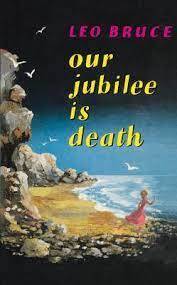
I've developed an increasing interest in Leo Bruce's detective fiction in recent years and after focusing initially on his pre-war Sergeant Beef novels, I've taken a liking to his post-war stories featuring the school teacher Carolus Deene. The blend of humour and quirky scenarios is appealing. My latest Bruce reading is Our Jubilee is Death, published in 1959.
The set-up is very good. Deene is summoned to Suffolk by his cousin Fay, who tells him about the bizarre murder of a detective novelist called Mrs Bomberger, who has been found buried up to her neck in the sand. He has an entertaining interview with a publisher called Agincourt who tells him how awful the victim was, and it's clear that there will be no shortage of suspects. I also appreciated the name-checking of Bruce's own publisher, Peter Davies.
Duly encouraged, I prepared myself for a top-notch read. Unfortunately, however, that the rest of the story didn't really live up to the promise of the situation. I was expecting more to be made of the victim's literary career and although flashes of wit continue to enhance the book, the story itself is rather downbeat - Deene describes it as 'beastly' - and I struggled to care about the culprit or the motive. I suspect that Bruce may have written the novel rather too quickly to invest the storyline with enough pazazz. Nor is the plot one of his best.
Steve Barge is among the people who have reviewed this novel and his reservations about it seem similar to mine. A pity, but Bruce always writes agreeably and I have more Deene novels lined up for future reading.
September 19, 2023
Glenn Chandler

I've mentioned my enthusiasm for the writing of Glenn Chandler many times on this blog over the years. I first came across him as the creator and writer of Taggart, and I greatly admired the twisty plots of his stories. To this day, I struggle to think of any TV cop show that has gripped me as much as those early episodes of Taggart.
I've also been interested to read and watch some of his work in the true crime field. If you consider his scripts for Taggart carefully, you'll pick up quite a few true crime references and his researches are as careful as his analyses are cogent. One of his more obscure yet still interesting non-fiction titles is Burning Poison, a book with a Liverpool setting that I picked up while working in the city.
His latest book is Sidney Fox's Crime, another non-fiction study, examining the Margate Hotel murder. It's a very interesting case, and his take on it is well worth reading. I hope to discuss the book in more detail in the near future, but on a brief trip to London last week I had the great pleasure of meeting Glenn in person for the first time. He was giving a talk about the Fox case, which was just as interesting as I anticipated. I also had the chance of an enjoyable chat with Tony Medawar as well as meeting a number of pleasant people with a shared interest in true crime cases.
Glenn told me about imminent celebrations of the 40th anniversary of the first Taggart story, Killer. Sadly, the great Mark McManus, who was so good as the eponymous gruff detective, died many years ago, and although Taggart continued for many years thereafter, inevitably it wasn't quite the same. But it was great to meet Glenn and to have a chance to express my appreciation of his writing, which really has given me a great deal of pleasure for a long time. And I'm not alone in this, of course. As I've mentioned previously here, Kate Ellis shares my enthusiasm for early Taggart and again, one can see Glenn's indirect influence in Kate's taste for elaborate and entertaining mystery plots.



